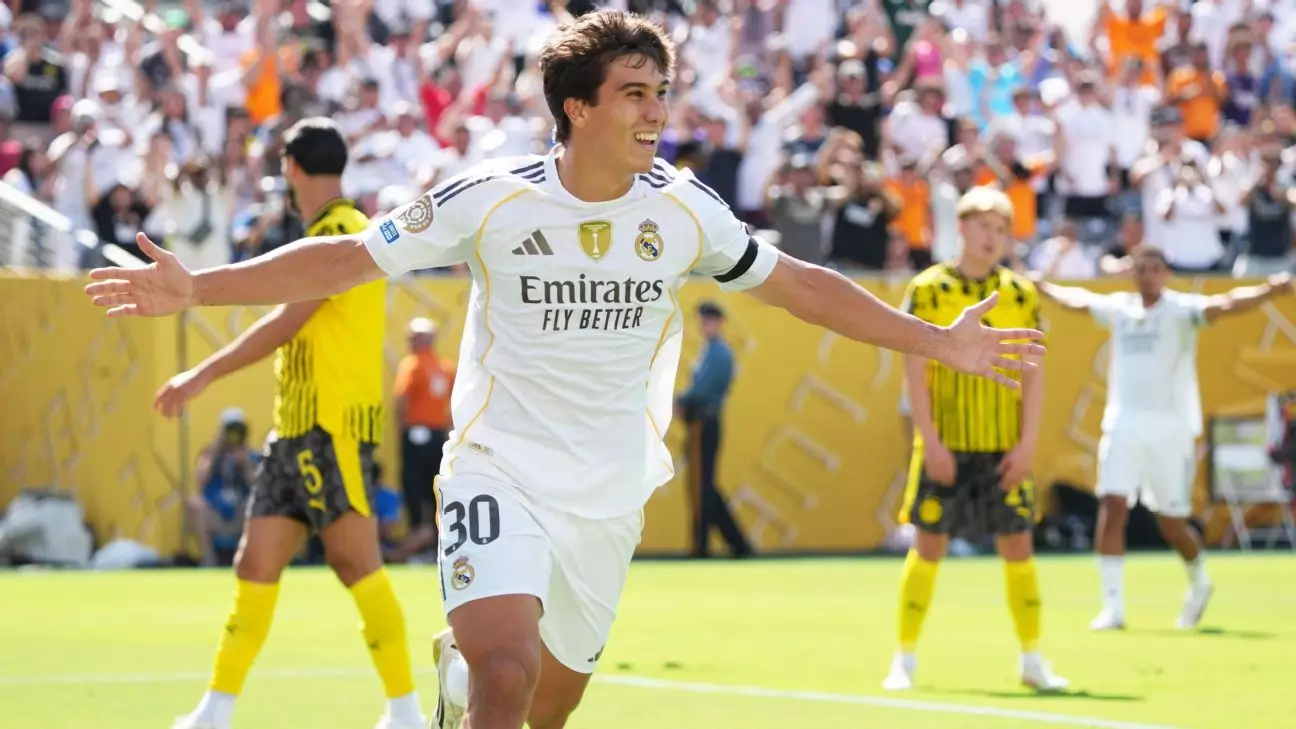In the high-stakes environment of the FIFA Club World Cup, where storied clubs and seasoned stars often dominate headlines, Gonzalo García’s exceptional performance offers a breath of fresh air and signals a significant shift in football narratives. This young talent, relatively unknown outside Madrid’s passionate fanbase, has seized the stage with a level of maturity and skill that defies his age. His journey is emblematic of the unpredictable nature of football—where talent, opportunity, and determination intersect to forge new legends.
Unlike the more celebrated players such as Kylian Mbappé, Vinícius Júnior, or Jude Bellingham, García has flown under the radar for most of his career. Yet, his recent exploits at the Club World Cup showcase a player who refuses to be overlooked. His goal in the first half of the quarterfinal, propelling Real Madrid to an early lead, was not just a testament to his scoring ability but also a demonstration of his tactical awareness and composure. These qualities have elevated him from a promising academy prodigy to a credible threat against Europe’s best.
What makes García’s rise so compelling is his stark contrast with the club’s typical path for young players. Real Madrid has historically been cautious—if not outright dismissive—toward integrating youth into their star-studded lineup. Over the decades, many young strikers with immense potential found themselves overshadowed or blocked by bigger names, from Ronaldo Nazário to Cristiano Ronaldo. García’s story, therefore, becomes a refreshing anomaly that challenges the club’s traditional approach. It hints at a possible shift towards nurturing homegrown talent rather than relying solely on megastars.
Performance Beyond Expectations — More Than Just a Tournament Fluke
García’s scoring streak, now matching top tournament scorers like Ángel Di María and Marcos Leonardo, underscores his capacity to perform under pressure. While tournament popularity often hinges on moments like Mbappé’s spectacular goal, García’s steady contributions—four goals in five games—are evidence of his consistency and adaptability. He’s not just a fleeting hero but a developing force that could influence Madrid’s attacking dynamics for years to come.
This surge in form is especially noteworthy considering his limited opportunities in the senior team before the tournament, with only six appearances and no goals. His previous experience in Castilla, Spain’s third-tier, where he netted 30 goals in 73 matches, laid a solid foundation. Yet, football at the highest level demands more than scoring prowess; it requires tactical intelligence, resilience, and relentless work ethic. García has exhibited all these qualities during his time in the U.S., earning respect and attention from critics and peers alike.
Significantly, Real Madrid’s new coach Xabi Alonso appears to be recognizing García’s potential, emphasizing his work rate and tactical intelligence. In a squad stacked with talent and laurels, García’s willingness to press, support, and make intelligent runs has endeared him to his coach. His emergence is arguably a deliberate statement from Alonso, subtly reminding star players like Mbappé of the importance of work ethic—a trait sometimes lacking in the silken talents of the current roster.
Implications for the Future: Opportunity or Obstacle?
García’s current form complicates Madrid’s attacking hierarchy, which already includes stellar names like Mbappé, Vinícius Júnior, Rodrygo, and the young Brazilian endrick. With multiple talents vying for limited spots, the competition for game time is fierce. However, García’s rise also creates a strategic advantage for the club, providing depth and an internal challenge that could elevate the entire attacking unit.
From his perspective, the immediate challenge is to maintain his momentum. His prolific scoring at the tournament has undoubtedly increased his market value, attracting interest from other European giants. For a club like Madrid, which traditionally leans on established stars, the question becomes whether young García can carve out his niche and prove that he belongs among the elite.
The broader lesson from García’s emergence transcends individual talent; it questions the long-standing development patterns at Real Madrid. Historically, the club’s policy has often been to acquire marquee signings and rely on foreign superstars. García’s performance signifies that nurturing youth can still produce world-beaters, provided the coaching staff recognizes and fosters their potential. Under Alonso’s leadership, there’s a possibility that Madrid might become a more fertile ground for developing homegrown talent, blending experience with new blood.
Beyond the Pitch: Lessons in Patience and Persistence
García’s story so far is as much about resilience as it is about talent. Despite limited senior appearances before this tournament, he believed in himself. His goal tally at Castilla and his willingness to work tirelessly — even when not guaranteed first-team minutes — reveal a player with the mental fortitude necessary for sustained success. Should he continue on this trajectory, he could redefine what it means to be a young player at a club prone to favoring proven stars over promising prospects.
Yet, the real test lays ahead. He must sustain his form and convince a coach famously loyal to proven winners that he deserves consistent minutes. The presence of seasoned internationals and club legends makes it difficult for newcomers, but García’s performance during this tournament suggests he’s not content to wait in the wings forever. His goal is now more within reach than ever, and if he maintains his focus, he might not just claim the Golden Boot but also change the perception of youth development at Real Madrid.
In fact, García’s rise embodies the broader narrative of modern football: a competitive landscape where talent alone is not enough; it’s about the ability to seize moments, adapt, and persist in the face of formidable obstacles. This young scorer has shown that sometimes, the most unexpected players are those who can spark the most significant shifts—both on and off the pitch.

